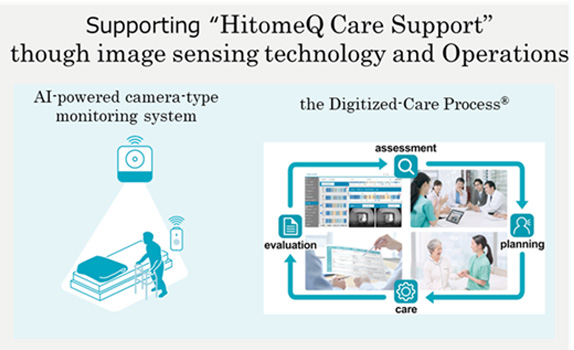Social Innovation
Providing Nursing Care Solutions to Address the Issues of a Super-Aged Society―HitomeQ Care Support
Related SDGs
![]()
![]()
![]()
![]()
Enhancing the QOL of the Elderly and their Caregivers through “the Digitized-Care Process®”
In recent years, Japan has faced social issues such as a shortage of caregiving personnel and increasing social security costs due to the rising number of individuals requiring long-term care.
In response, Konica Minolta is contributing to the improvement of quality of life (QOL) for both the elderly and their caregivers with "HitomeQ Care Support", which integrates its proprietary image sensing technology with the wisdom and experience from the caregiving field.
By utilizing near-infrared cameras and an AI-powered camera-type monitoring system installed on ceilings to detect movement, the behavior of residents in care facilities is analyzed. This technology shifts operations from traditional subjective evaluations based on the experience of seasoned staff to a digitized caregiving process® based on objective assessments derived from image sensing data. Consequently, this allows for evidence-based, individualized optimal care. For example, as a result of taking fact-based measures to prevent falls, we reduced the number of falls by approximately 80% at facilities where this service was introduced. In addition, operations became significantly more efficient by levelling the workload among staff. This enables our facilities to be managed with appropriate staffing, which contributes to both the improvement of care quality and the stabilization of facility operations. In fact, we have achieved a roughly 30% average improvement in the work efficiency of nursing care staff through more efficient information sharing and room visit procedures.
With the revision of nursing care fee system in April 2021, Japan's approach to caregiving has pivoted significantly towards scientifically based caregiving. By utilizing data obtained through HitomeQ, the precise condition of each elderly individual can be accurately understood, and appropriate rehabilitation can be provided. This aims to maintain and improve the Activities of Daily Living (ADL*) of the elderly, prevent the deterioration of their care levels, and contribute to the reduction of social security costs.
*ADL: Activities of Daily Living. This term refers to the extent to which a person can independently perform basic daily tasks, such as turning over, getting up, dressing, eating, urinating, defecating, bathing, moving around, and climbing stairs.


